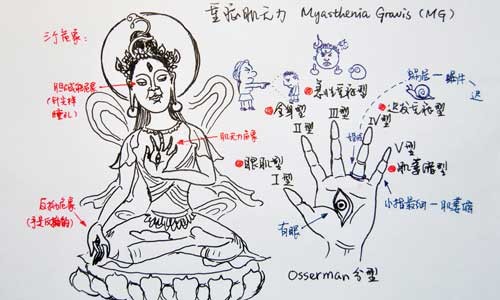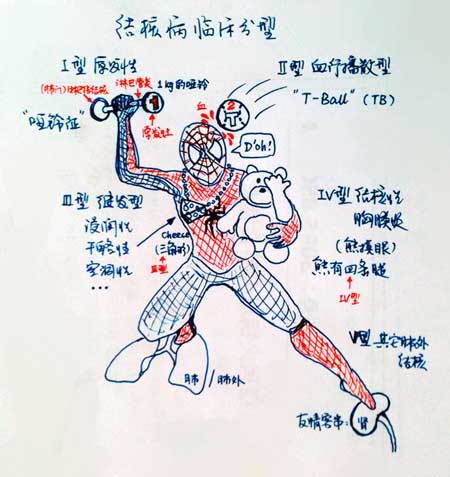What do Spider-Man, Chinese chess and a pious Buddhist figure all have in common? They are all linked to debilitating conditions myasthenia and lymphoma, according to a series of medical notes posted online in the form of sketches by Shu Chang, a PhD candidate at Peking Union Medical College (PUMC。)
Shu, who originally hails from Kunming in south China's Yunnan Province, has compiled notes that cover many medical nomenclatures and symptoms of diseases he has studied.
Unlike many of his peers who highlight passages in textbooks or scribble key words on post-stick notes to memorize course material, Shu adopts a more vivid approach. He sketches intricate cartoons, laden with details that help him remember what he has learned in university lecture halls.
He started to draw pictures two years ago in a bid to convert complex medical theory into more easily understood information.
Shu's comics star Spider-Man as a patient suffering tuberculosis.
In one sketch, the superhero holds a dumbbell in one hand and a teddy bear in the other.
In another, playing cards of a king and queen are put together to explain inflammatory bowel disease (IBD,) while another depicts a zombie from the mobile game "Plants versus Zombies" suffering the side-effects of anti-tuberculosis medication in other comic.
Unorthodox technique
Along with these colorful characters, Shu writes the symptoms of each disease in both English and Chinese. Sometimes, he uses English words that share similar pronunciations with symptoms to serve as a memory hook. It takes Shu just a day to sketch and upload his comics, but it can take weeks for him to find inspiration for his designs.
"I love European and American comics, from Sponge Bob Square Pants to Spider-Man, because they are suitable for children and adults," the 26-year-old mused, naming his favorite cartoon as The Simpsons. He also enlists the support of America's favorite dysfunctional, yellow family for his unorthodox medical notes, which consist of more than 50 different sketches.
Vivid imagination
Inspired by the book Visual Mnemonics for Pathology by American co-authors Laurie L. Marbas and Erin Case, Shu discovered pictures were an effective study aid that helped him memorize bland, yet essential course materials.
He wasn't much of an artist initially, but knew that if he persevered he would succeed. At first, he imitated the technique outlined in Marbas and Case's book by drawing three suggested pictures.
He then began to create his own ones, demonstrating his individual flair.
Creative learning process
Shu studied biology at Tsinghua University for two years, before deciding to change his major to clinical medicine.
Upon making the switch, Shu found medical theory, such as anatomy, difficult to grasp. Its complicated jargon almost made biology seem like a cakewalk.
"As medical students, we were required to read a textbook with more than 700 pages within two months, then take an exam," Shu said.
"Some diseases we were tested on aren't common in everyday life. Everything we had to learn was from the textbook, so I drew comics to help me to study and pass the exam."
Shu, who never received any formal training in art, was influenced at an early age by his mother's passion for drawing.
[page title= subtitle=]
"When I was little, I used to write letters to my mother," Shu said.
"If I came across a Chinese character that I didn't know how to write, I would convey the meaning by drawing pictures. I also drew pictures to remember ancient Chinese poems when I studied at middle school."
Online impact
Shu first shared his works with the online world when he uploaded his comics on Renren, one of China's most popular social networking websites.
They were an instant hit, gaining praise from his peers who said the drawings helped their own study regime and injected life and color into the curriculum.
Shu insists that his motivation for sketching his drawings was never to become famous. He simply wanted to share his notes and help his peers.
However, his profile has risen thanks to students who see his notes as funny, vivid and creative. His drawings have been shared with a much wider audience, having been reposted countless times by Web users.
"Teachers have different views on my notes," Shu said of his comics.
"Some think they can help freshmen, while others believe it's my own unique way of learning and perhaps it isn't suitable for everyone."
Shu has found academic support from one of his teachers though.
Professor Liu Zhengyin from the infections department at PUMC Hospital has given Shu's drawings the thumbs up and encouraged him to sketch more.
But in the cyber world, some vindictive Web users have posted disparaging comments under Shu's drawings.
"These [drawings] might be useful in popularizing medical theory with ordinary people, but they probably offer little help to medical students," wrote one Web user named "00naive00."
Shu shrugs off any criticism, saying that his notes are merely a study tool. He affectionately compares his notes to "a walking stick that students can get rid of it once they learn the content."
Future after study
Shu, who graduates with his PhD next year, wants to popularize medical theory to a wider audience beyond just sketching his abstract drawings.
He writes a column called "Rumor Terminator" for popular Chinese science and technology website, Guokr.
In it, he tries to dispel medical myths and bring clarity to complicated discussions about health and wellbeing.
"There are many rumors online nowadays. People can't tell what is true or false about medical issues," he said.
"I've written about contact lenses and other health issues in the hope people won't be cheated and can become better informed."



















